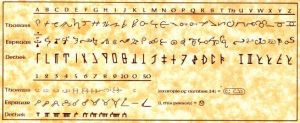Difference between revisions of "Forgotten Realms Languages"
From OakthorneWiki
Jump to navigationJump to search| Line 22: | Line 22: | ||
==Dead Languages== | ==Dead Languages== | ||
| + | These languages are truly dead - no mean feat in a world where folk might live hundreds or even thousands of years! No one remembers how they were pronounced or even the majority of their vocabularies. They may turn up in writings here and there that can challenge even the best of sages to attempt a translation, but may not be taken as Language Proficiencies. | ||
* '''Auld Thorass:''' The original spoken language of the alphabet of the same name is long dead. Despite this, it shares enough of its structure with Common that those who know it can usually discern what is intended to be communicated when writings in Auld Thorass are found. Simple remnants of this language can occasionally be found in the speech of rural or particularly old speakers of Common, who pepper their speech with "thee's" and "thou's" in a stilted, archaic argot. | * '''Auld Thorass:''' The original spoken language of the alphabet of the same name is long dead. Despite this, it shares enough of its structure with Common that those who know it can usually discern what is intended to be communicated when writings in Auld Thorass are found. Simple remnants of this language can occasionally be found in the speech of rural or particularly old speakers of Common, who pepper their speech with "thee's" and "thou's" in a stilted, archaic argot. | ||
* '''High Tongue:''' Nothing is known of the origins of this language - indeed, sages can't even agree on its nature. Some claim that it was once a language of great magical potency, whereby those who spoke it could speak changes into reality; others believe that it was never an actual full language but has simply always been simple expressions of magical potency given a symbolic sound and rune. | * '''High Tongue:''' Nothing is known of the origins of this language - indeed, sages can't even agree on its nature. Some claim that it was once a language of great magical potency, whereby those who spoke it could speak changes into reality; others believe that it was never an actual full language but has simply always been simple expressions of magical potency given a symbolic sound and rune. | ||
Revision as of 20:52, 24 December 2013
Alphabets of the Realms
These are the primary alphabets used to express written language. Most languages use one of these in writing. Proficiency with a given language also imparts proficiency with the written alphabet, although this doesn't allow someone to read other languages written in that alphabet - they can simply recognize the use of the alphabet in a way that is strange to them.
- Thorass: An ancient near-universal language of the long-ago Realms, Thorass has fallen into extinction (see "Dead Languages" below). It is frequently found on tombs and other ancient structures, but most relevantly is the alphabet used in Common and a great many regional languages.
- Espruar: The swirling, artistic alphabet of the elves is half communication and half decoration. It can be used to write any of the elven languages, as well as Common and most regional languages.
- Dethek: The dwarven alphabet is a series of runic letters perfect for etching into an enduring surface with a chisel and hammer. The Dethek language is used to of course write the dwarven languages, and can be used to render Common and a handful of other tongues as well.
- High Tongue: Arcane Spellcasters Only; Automatic. An ancient language now deeply fragmented and incomplete, the High Tongue is the language of arcane spellcasting. Those who wield such power automatically know it, as part of their immersion in such magics, and those without it do not learn it save in rare instances (see "Auld Wyrmish" below).
Contents
Regional Languages
The North
x
Racial Languages
x
Trade Languages
x
Monstrous Languages
x
Dead Languages
These languages are truly dead - no mean feat in a world where folk might live hundreds or even thousands of years! No one remembers how they were pronounced or even the majority of their vocabularies. They may turn up in writings here and there that can challenge even the best of sages to attempt a translation, but may not be taken as Language Proficiencies.
- Auld Thorass: The original spoken language of the alphabet of the same name is long dead. Despite this, it shares enough of its structure with Common that those who know it can usually discern what is intended to be communicated when writings in Auld Thorass are found. Simple remnants of this language can occasionally be found in the speech of rural or particularly old speakers of Common, who pepper their speech with "thee's" and "thou's" in a stilted, archaic argot.
- High Tongue: Nothing is known of the origins of this language - indeed, sages can't even agree on its nature. Some claim that it was once a language of great magical potency, whereby those who spoke it could speak changes into reality; others believe that it was never an actual full language but has simply always been simple expressions of magical potency given a symbolic sound and rune.
